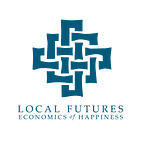Rising from Disaster
Spotlight on Resilient Power Puerto Rico & Maasai Center for Regenerative Pastoralism
The industrialized, corporate-controlled, fossil fuel-based world we’ve lived in for so many years is crumbling. Climate change is stoking natural disasters with unprecedented force and regularity. Civilization has reached a fork in the road and — depending on the path we take — we will either spiral into chaos or make something beautiful out of the ashes of the old system.
It’s that second path that this post is all about.
It highlights the work of two organizations that have built themselves up in response to major crises caused by climate change — one in Puerto Rico and one in Kenya. In both cases, a crisis presented the opportunity not just to reconstruct what existed before, but to create a genuinely new way of doing things that is decentralized, place-based, and local.
In Puerto Rico, Hurricane Maria devastated the island in 2017, even more so than was previously thought. Yet the response from the US government has been to ignore the severity of the problem and to continue treating Puerto Ricans as second-class citizens.
In response, many Puerto Ricans are taking matters into their own hands, and one of the most inspiring examples is Resilient Power Puerto Rico. Launched after Maria hit the island and knocked out nearly all of its electric power infrastructure, this group developed small-scale, mobile solar power kits, which it is now distributing to the most remote and hardest-hit communities — and eventually, it hopes, to every household on the island. Along the way, solar technicians will train local residents in the technology used, and those residents will train other residents, and on, and on. What emerged as a rapid response to a climate-caused disaster will thus evolve from a stopgap measure into a long-term effort to break free from the fossil fuel industry, and to empower communities to build, repair, distribute, and take charge of their own energy future.
The emancipatory power of self-reliance lies behind the work of another NGO, this one in Kenya. For Dalmas Tiampati and his organization, the Maasai Center for Regenerative Pastoralism, the goal is to break free from the need for food aid, and from predatory non-local businesses that try to profit from the needs of vulnerable populations.
After going through Kenya’s western-style public school system, Dalmas became disillusioned and decided to return to his childhood home among the Maasai people, and to take up the traditional life of a cattle herder — a pastoral way of life that has lasted for centuries. In the past, the grasslands were a plentiful source of food, supporting a nutrient-dense, high-protein diet. And medical needs — even for problems such as fractures and tumors — were perfectly well met through traditional healing. As Dalmas describes his return:
The community was so happy and our elders really loved that after getting a University degree I was coming home and investing in our village. I become a role model for our young people and was highly respected for understanding what is really important in life; community, good health and a sense of identity.
However, after a stretch of several dry years in a row, severe drought struck Dalmas’ community in 2013, wiping out 90% of their livestock — a consequence of climate change. Along with the drought, the community was struggling with soil quality problems that stemmed from repeated overgrazing — a consequence of being given unreasonably small plots of land by the Kenyan government. Compounding these struggles was the fact that the only way the Maasai could pay back the loans they took out to survive the drought was to convert local acacia trees into charcoal, further diminishing the resilience of the soil. Dalmas describes the dire situation:
My community were reduced to beggars who depended on food relief to survive. This food was poor quality and very different from what we were used to, so it made us sick…People started coming to me for help. I had a little money, so I helped buy food, but the food was being sold expensively by exploitative business people who hoarded it in order to raise demand to increase their profits.
In response, Dalmas founded the Maasai Center for Regenerative Pastoralism, whose goal is to address the root causes of the Maasai people’s vulnerability. It promotes holistic grassland management — intensive rotational grazing that sequesters carbon, makes grasslands more resistant to drought and flooding , ensures water security, and helps prevent the pastoral way of life from getting swept away by global economic and environmental forces.
Read about other ecologically-focused grassroots projects on our Planet Local: Ecology page.
Read about other decentralized renewable energy initiatives on our Planet Local: Local Energy page.
And if your community is facing a crisis today (or preparing to face one in the near future), now may be the perfect time to start thinking creatively and planting the seeds of a better, more resilient, more localized system that can see people through disaster — both now and many years down the line.
Visit www.localfutures.org to learn more about Planet Local and our other projects.
